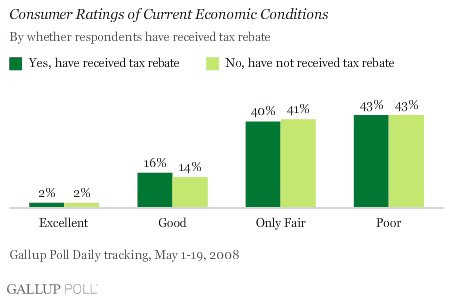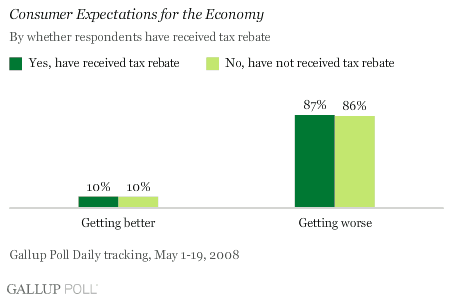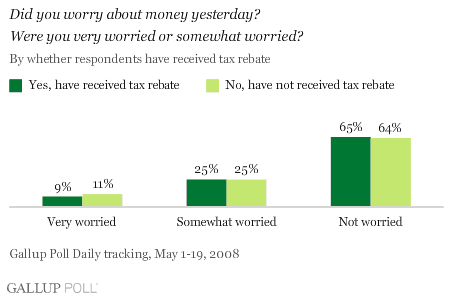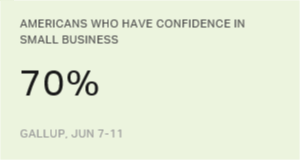PRINCETON, NJ -- When asked to rate current economic conditions, 43% of those who have already received their tax rebates rate the U.S. economy as "poor" and 18% rate it as "excellent" or "good," while 43% of those who have not received a rebate also rate the economy as "poor" and 16% rate it as "excellent" or "good."

Consumer Confidence and Tax Rebates
Based on the Economic Stimulus Bill that became law on Feb. 13, about 130 million Americans will receive an estimated $105.7 billion in tax rebates over the next several months. Of course, the idea behind this emergency legislation was to cushion American consumers against the ill effects of the current economic slowdown, bolstering their confidence and their spending. In turn, increased consumer confidence and spending would mitigate the length and depth of the economic downturn.
At this point, 28% of Americans in Gallup's daily surveys report having received their tax rebates. As noted, those who have already received their rebates rate current economic conditions essentially the same as those who have not received a rebate. Similarly, 87% of those who have already received a rebate say economic conditions in the country as a whole are getting worse, not better, while 86% of those who have not received a rebate hold this same view.

Worry About Money and Tax Rebates
As is the case with overall consumer confidence, the tax rebates seem to have done little to relieve consumers' worries about their own financial situations. When asked if they "worried about money yesterday," 9% of those who have already received their rebates stated that they were very worried, and 25% said they were somewhat worried. Among those who had not received a rebate, the results were essentially the same, with 11% saying they were very worried and 25% somewhat worried about money the day before the survey.

Commentary
Australian consumer confidence increased in May from a 15-year low after the government announced record income-tax cuts, according to a Westpac Banking Corp. and Melbourne Institute survey. While economists in Australia were disappointed in the size of the bounce in sentiment the tax cuts got in their country, U.S. economists, policymakers, and politicians may be even more troubled by the minimal impact of the 2008 tax rebates on consumer confidence.
Of course, the most anticipated and direct impact of the current tax rebates is an increase in consumer spending. In this regard, the National Retail Federation projects that about 40% of consumers will actually spend their rebates, pumping about $42 billion of added spending into the economy. It also suggests that much of this additional spending will go to gas, food, and healthcare expenditures.
Gallup's survey results suggest that the stimulative effect of the tax rebates is likely to be limited to its direct spending aspects, at best. There seems to be little likelihood that the tax rebates will stimulate added non-rebate-related consumer spending, because they really don't seem to be cheering up consumers. In fact, given the current consumer mood, it would be possible to argue that consumers will actually spend less of their rebates than estimated, but that seems doubtful given today's rising prices for essentials.
Survey Methods
���۴�ýis interviewing no fewer than 1,000 U.S. adults nationwide each day during 2008. The rebate and economic questions analyzed in this report are based on combined data of more than 9,427 interviews from May 1-19, 2008. For results based on this sample, the maximum margin of sampling error is ±1 percentage point.
Interviews are conducted with respondents on land-line telephones (for respondents with a land-line telephone) and cellular phones (for respondents who are cell-phone only).
In addition to sampling error, question wording and practical difficulties in conducting surveys can introduce error or bias into the findings of public opinion polls.
To provide feedback or suggestions about how to improve Gallup.com, please e-mail feedback@gallup.com.
